by Taif Alkhudary
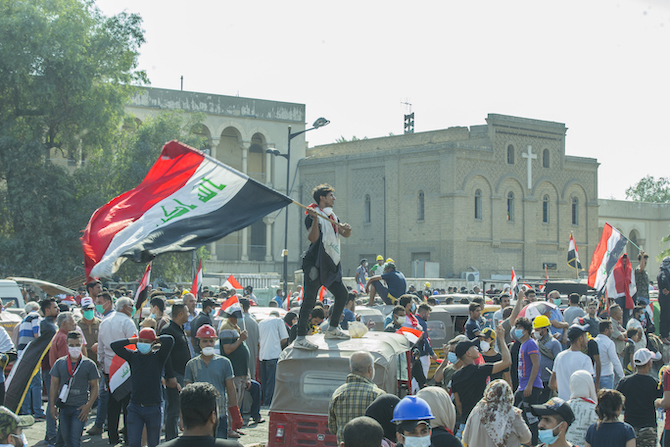
Since October 2019, when mass anti-government protests first emerged in Baghdad and Iraq’s southern provinces, there has been an upsurge in violence against critical voices at the hands of militias and the Iraqi security forces. This continued to increase as protests dwindled with activists becoming the victims of targeted assassinations. It culminated with the fatal shooting of political activist Ehab Al-Wazni in Karbala in May 2021, leading key opposition parties that emerged from the October protests to call for a boycott of upcoming elections.
In this article, I draw on interviews with opposition activists and parties to argue that, in part at least, the boycott movement emerged out of an understanding that the Muhasasa system has failed to install effective democracy in Iraq and a desire to bring this into being through a shift towards a civic ethic of ‘mawatana’. I then address some of the challenges that opposition parties face in trying to make this a reality.
From ‘Muhasasa’ to ‘Mawatana’
When making the argument for a boycott, activists have often suggested that to them democracy does not simply entail being given the right to participate in elections. Rather, it should also include the ability to criticise the government without being subject to arbitrary attack and the provision of services and decent living for its citizens. Others have pointed out that the power of the dominant ethno-sectarian parties – garnered through the control of state resources and arms – means that emerging parties and independent candidates are unable to compete on an equal platform. In effect, they charge the post-invasion political system with failing to enable the development of ‘effective democracy’, defined in terms of an environment where citizens are empowered to influence decision making through the provision of adequate economic and cognitive resources, such as education and skills. Instead, it has only guaranteed ‘electoral democracy’, where citizens go out to vote every four years, but a variation of the same actors remain in place.
Others see the boycott movement as an attempt to restore the trust that citizens have lost in politics since 2003, as a result of politicians’ inability to fulfil their promises. According to interviewees, this sense of distrust was heightened by events in 2015, when establishment activists allowed the Sadrists to co-opt popular demonstrations as a means of increasing their support base at the expense of the protest movement. Thus, for some opposition parties, boycotting the elections is a way to stay true to the commitments and goals of the October protests. As one activist explained, rather than running for election and winning a small and ineffectual number of seats in parliament, their aim is to continue to call for the overhaul of the political system from the outside. In part, this serves as a reminder that protesters did not simply demand early elections, but also wanted an interim government made up of independent candidates, the creation of an independent electoral commission and for the political parties’ law to be implemented effectively in order to reveal parties’ funding sources and ensure that they do not have armed wings. In addition, by proving that there are political actors that will come through on their commitments, interviewees hoped that any short-term losses incurred through boycotting elections are offset by the restoration of the general public’s faith in politics as an avenue for substantive change.
However, this attempt to rebuild trust is based on a new form of politics grounded in what one interviewee referred to as an ethic of citizenship, or ‘mawatana’, as opposed to ‘muhasasa’. Fadhal Al-Rubai has argued that by placing parties and elites competing to protect their own interests at the centre of government, the Muhasasa has destroyed and rendered meaningless the civic duty on which the social contract is based. Interviewees suggested that in order to overcome this and restore a sense of ‘mawatana’, the system of distributing positions in government according to sectarian quotas must be abolished. It must be replaced by an approach whereby candidates are selected on the basis of their experience and competence and a willingness to put the interests of the Iraqi people above their own.
Challenges Facing the Boycott Movement
While opposition parties campaigning for the boycott seem to have developed a strong political ideology to justify their stance, they nevertheless face a number of challenges. The first is how to come up with the concrete strategies necessary to make the shift from muhasasa to mawatana. As it stands, there remains no clear roadmap as to how opposition groups intend to push for this shift to take place. If anything, thus far activists have only been able to articulate the kind of political community they want to see come into being through modelling this during the protests themselves, by way of the horizontal, consensus-based and participatory modes of organisation they employed, as opposed to expressing concrete policies.
The second issue is that Iraq’s organised opposition groups remain fractured and have sought to discredit each other’s positions. For example, those who have opted to participate in the elections have criticised the stance of those boycotting, suggesting that they are making excuses for not managing to finish the registration process, or that they never actually wanted early elections, with the violence against political activists and independent candidates instrumentalised to justify this position. The second guessing of the motives of boycotting parties is indicative of the prevalence of distrust of the political agendas of others within the opposition movement, making it difficult to organise as a single unit. This, at least in part, derives from the general distrust of politics mentioned above. More specifically, however, it is also the result of the fact that a number of establishment politicians have sought to co-opt the momentum from the protest movement, launching parties that are presented as youth and protester-led but which in fact have strong ties to the dominant post-2003 political parties. In this context, it becomes further difficult for opposition groups to know who they can trust.
Conclusion
Despite the struggles they face, it would seem that at least some segments of Iraq’s opposition forces are beginning to build a forward-looking political movement. Indeed, on 4 September 2021, 40 civil and political organisations with affiliations with the protest movement and who have supported the calls for boycott met to form the ‘Iraqi Opposition Forces’. While the exact composition and policies of this new group remain unclear, it is indicative of the emergence of an organised Iraqi opposition with a popular support base from within the country for arguably the first time. This is noteworthy in so far as it stands in stark contrast to those politicians who have dominated the country since 2003, and who imposed the politics of Muhasasa on the people of Iraq from the outside.



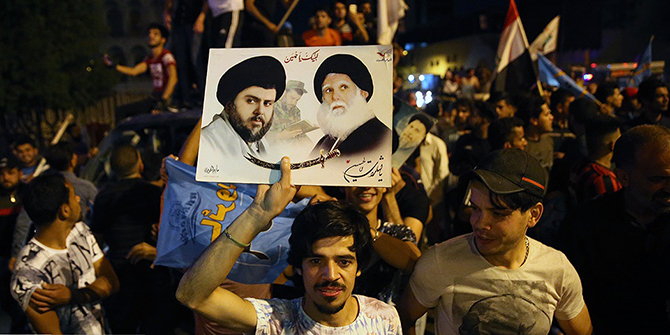
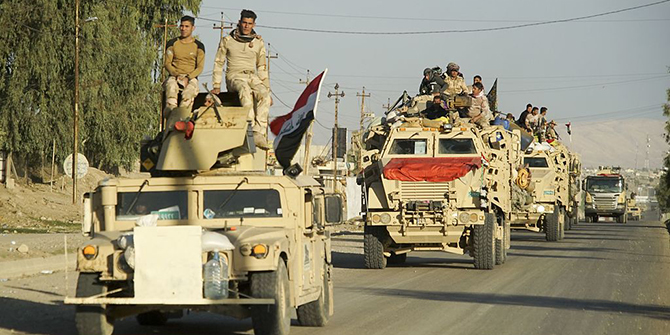
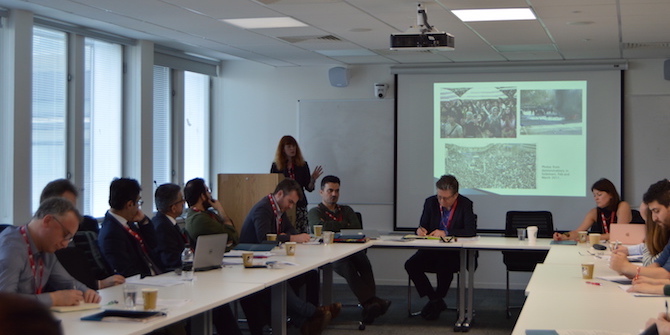
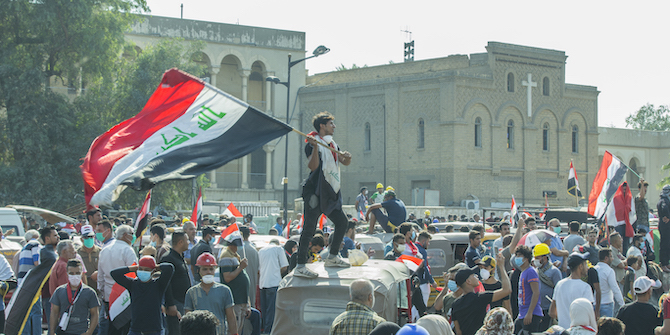
very nice information, keep sharing these kind of articles
“From Muhasasa to Mawatana: The election boycott movement and prospects for effective democracy in Iraq” is a title that suggests a critical analysis of Iraq’s political landscape and the challenges facing its democratic institutions. The terms Muhasasa and Mawatana refer to two political movements in Iraq, with Muhasasa being associated with sectarianism and clientelism, and Mawatana emphasizing the need for a more inclusive and participatory democracy. The election boycott movement is a response to the perception that the political system in Iraq is corrupt and unresponsive to the needs of its citizens. The article likely explores the prospects for effective democracy in Iraq, taking into consideration the role of civil society, the media, and international actors.
Regards
Sarkari Result
good post dear
Best Information share
very good a
Thanks for sharing this information
very nice portal i like it
nice
This article is very useful and very informative
Amazing artical
Very nice information Sarkari Naukri thanks for sharing this news.
Very good work. Thanks for sharing this information.
Helpfull content. Thanks For Sharing.
Thanks For Sharing Such these Content .
nice work thanks for information
sarkariresult
Thanks for sharing such a good and informative content to all of us.
Very Good Article. Great Information
This is very informational thank you
This Website is very informative. thanks for this
nice information
would love to read this article and really help me a lot and want to bookmark this page. Thank you
Ahh that is great thank you ! Good for special needs too !
Thanks for sharing valuable information, good keep it up..
Thanks For Sharing Such these Content .
Your site was very informative and interesting as well. Thanks a lot and good luck.
An article worth reading thanks
Nice information.
The information is really great and please share these types of article on daily basis
Interesting. Keep it up
Nice Article with grate information.
An article worth reading, and it included most of the ideas we adopt in Baiet Watani Party
Thanks for nice post
Yes bro.
This article gives the light in which we can observe reality. It's great and gives in-depth information. You can visit our good article for information about computer, internet, technology.
Good one on democracy. I Just bookmarked your page.
thanks for giving useful article
very good job thanks for update us
great work use full information
Nice Information i like it
Taif Alkhudary ji nice effort thank u so much
Nice Information i like it
nice
Nice Article with grate information.
Thanks for the sharing information
Thanks a lot for sharing this post with us. This is very helpful content for me thank you again so much.
Thanks for the sharing information
Tamilblasters
An article worth reading, and it included most of the ideas we adopt in Baiet Watani Party
A good blog on election boycot movement on iraq and thanks for sharing this article.
Interesting Portal and thanks for sharing
very nice portal i like it
An article worth reading, and it included most of the ideas we adopt in Baiet Watani Party